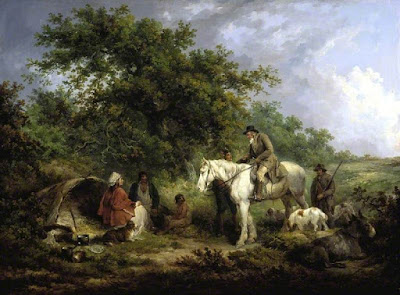Bill Gates, John Prescott Neil Kinnock and The House of Lords
People
 |
Morning (The Benevolent Sportsman), George Morland (1763-1804)
Photo Credit: The Fitzwilliam Museum [CC BY-NC-ND]
|
Question from
habituallinestepper1: “What do you think you, personally,
should be paying in taxes each year?”
Gates: “I think our system can be a lot more progressive (that is richer people
paying a higher share).
“A key element is making capital gains taxation more like ordinary
income (some have suggested making them the same) and having an estate tax more
like we had in the past (55% above $3.5M).
“European countries collect a lot more taxes but through consumption
taxes, but those are not progressive.
“If people want the government to do more it needs to be funded and I
see us needing to improve our education and health services.
“So yes, I have paid $10B but I should have had to pay more on my
capital gains.”
Straight from the horse’s mouth. Progressive taxation to further fund
education and the NHS. Thank you, Bill.
The House of Lords:
 |
Studies Made in the House of Lords, John Lavery (1856-1941)
Photo Credit: The Fitzwilliam Museum, [CC BY-NC-ND]
|
(The Establishment, Owen Jones, pg 3)
Actions speak louder
than words.
*(Church of England) bishops sit in the House of Lords making Britain the only country – other than Iran – to have unelected clerics sitting in the legislature.
(The Establishment, Owen Jones, pg 11)
*How admirable that so many peers wanted to speak in a Lords debate on housebuilding – but roughly half of them had declarable interests.
Labour’s Lady Warwick conceded that she chaired the National Housing Federation. Tory Lord Borwick stated that he was “a house developer with sites in Bicester, Scotland and Sussex”, while his colleague Lord Patten had interests in two housebuilding companies and an insurance firm that has gone into the housing game.
Crossbencher Lord Best said he chaired two housing commissions and was a vice-president of two relevant lobbies. The Earl of Lytton (crossbencher) was “a property professional” and his colleague Lady Watkins “senior independent director at Southern Housing”. The Earl of Caithness had been both a land agent and an estate agent, while Lord Beecham (Lab) was a big knob in the Local Government Association.
Another to speak in the debate was Lord Bethel, a newly arrived hereditary Tory. He did not mention his financial interests in PR firm EQ Communications, whose website boasts of its experience in, er, the housing sector.
(Private Eye, No 14)
Keep up the good work Ian.
*A Labour peer claimed almost £50,000 in attendance and travel expenses covering every single day the House of Lords was sitting last year, despite never speaking or asking questions…
The former trade union general secretary David Brookman was among dozens of members of the Lords who never took part in a single debate, while almost a third of the 800 peers barely participated in parliamentary business over a 12-month period despite costing almost £3.2m in allowances.
…The former Lords speaker Frances D’Souza, a long-term advocate of reform said the findings corroborated “what everyone suspects is going on”, and that a minority of peers risked discrediting the hard work of their colleagues. “There’s clearly a need to reduce numbers,” Lady D’Souza said, adding that the research “clearly shows there are people who are attending the House of Lords who are not contributing, and therefore they are simply redundant”.
Another institution ripe for radical reform.
Comments
Post a Comment